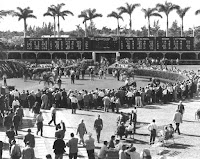 |
| Florida Derby 1969 Florida State Archives |
By Jane Feehan
It’s hard to believe today’s popular Gulfstream Park launched with a false start in 1939.
Local newspapers drummed up enthusiasm about the new park constructed
in only a few months before the February 1, 1939 opening. Builder-developer, 29-year-old
John C. Horning of the Hollywood Jockey Club and a Miami resident, and
architect Robert Law Weed of Coconut Grove, assured reporters that Gulfstream’s
grandstand would be “without peer at any track in the nation.”
The grandstand could seat 7,000. Its roof extended 86 feet toward the track and could withstand 175 mph winds. The lower end of the roof sloped 52 feet from the track and would provide cover for judges and reporters; a camera was installed above their seats. For well-heeled or connected patrons, 130 boxes 8 feet by 10 feet were installed for added seating comfort and privacy.
The 200-acre racing park
sat between U.S. 1 and the ocean. Most grandstand spectators would have a view
of the Atlantic Ocean just blocks away. Gulfstream’s infield held lush gardens
and two lakes connected by a canal. Australian pines were planted along a driveway
and around the site. Forty acres of parking were expected to be full on opening
day.
In fact, according to news accounts, the parking lot overflowed on opening day. The crowd, estimated between 18,000 and 20,000—the largest ever to attend a track opening in Florida—jammed highways and tore through Gulfstream’s fencing to gain entry.
Norwegian figure
skater and film star Sonja Henie was on hand to cut the ceremonial opening day
ribbon. Newspapers reported that the day was “brilliant.” Newsreel cameras
captured the carnival atmosphere. The inaugural event was attended by locals,
winter residents and an A-list of attendees that included politicians and legendary
columnist Damon Runyan.
Opening day, mutuel gambling play totaled $224,287. On the
fourth day, gambling play plunged to $81,922. The revenue stream could not
maintain opening day flow. An expected armored truck failed to deliver $150,000
to bankroll operations. Gulfstream Park shuttered after four days. Reporters wrote that Horning’s financial
backing failed to materialize; he could not come up with the cash to continue.
Various reasons for the track’s failure appeared in news
accounts. One reason may have been trouble from competitors. Hialeah sat only
12 miles from Gulfstream Park and 25 miles from Tropical Park. A state probe
into gambling did not confirm improprieties. Some pointed to Horning’s youth.
It appeared he had “been taken.” The
young developer, who received high praise was now considered a “chump.” The park,
once off to a record-breaking fast start, sank into bankruptcy a year later in February
1940. Wrong man, wrong time.
 |
| Gulfstream Park 1948 Florida State Archives |
He was already owner of the successful Exotic Gardens Florists, the company that later designed the park’s gardens and the unforgettable horseshoe wreaths seen in the track’s Winner’s Circle. In 1952, he established what became a horse racing classic, the Florida Derby.
Some of the track’s
success can also be attributed to Donn’s wrangling from Hialeah its coveted mid-winter racing dates. It took 25 years but the Scotsman, who first came to Miami in 1915 on his honeymoon with bride Nellie, lived to see Gulfstream racing during the best days of Florida winters.
When James Donn, Sr. was asked what he did for a living, he would
often tell strangers he was a florist. It could also be said he was the right
man who came to Gulfstream’s rescue at the right time.
Copyright © 2023. All rights reserved. Jane Feehan
Sources:
Miami News, Feb. 1, 1939
Miami Herald, Feb. 1, 1939
Miami Herald, Feb. 2, 1939
Miami News, Feb. 7, 1939
Miami Herald, Feb. 7, 1939
Miami Herald, April 23, 1939
Miami Herald, Feb. 4, 1940
Miami News, Feb. 15, 1940
Miami News, Dec. 1, 1944
Miami Herald, July 12, 1972
Tags: Florida sports history, thoroughbred racing, horse racing, Hallandale history, Robert Law Weed, Jack C. Horning, architect, Exotic Gardens
